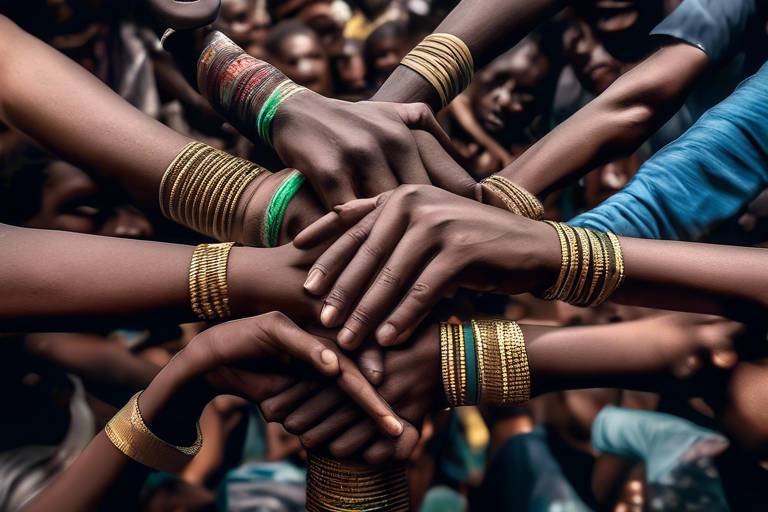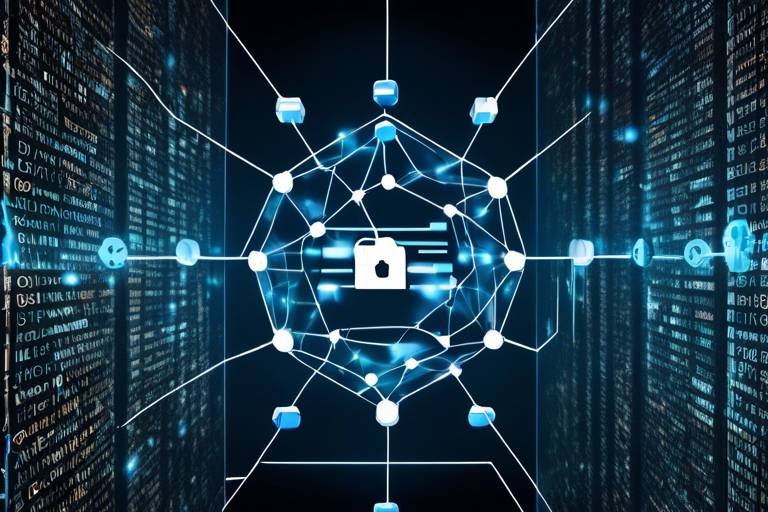How Blockchain Can Facilitate Better Collaboration Among NGOs
In today's interconnected world, Non-Governmental Organizations (NGOs) are constantly seeking innovative ways to enhance their collaborative efforts. One groundbreaking technology that has emerged as a game-changer is blockchain. But what exactly is blockchain, and how can it revolutionize the way NGOs work together? This article delves into the transformative potential of blockchain technology, highlighting its benefits, challenges, and practical applications specifically tailored for NGOs.
To truly appreciate how blockchain can facilitate better collaboration among NGOs, it’s essential to understand what blockchain is. At its core, blockchain is a decentralized digital ledger that records transactions across many computers in such a way that the registered transactions cannot be altered retroactively. This unique feature ensures that all data is transparent and immutable. Imagine a shared Google document where everyone can see changes in real-time, but no one can erase the history of edits. This is the essence of blockchain. With its key features such as decentralization, transparency, and security, NGOs can leverage this innovative tool to enhance their collaborative efforts, ensuring that every stakeholder has access to the same information in real-time.
When it comes to collaboration, the advantages that blockchain offers to NGOs are profound. By embracing this technology, NGOs can enjoy a range of benefits that can significantly enhance their operational efficiency and impact. Let's explore some of the most critical advantages:
One of the most compelling features of blockchain is its immutable ledger. This means that once a transaction is recorded, it cannot be changed or deleted. For NGOs, this promotes unparalleled transparency in their operations. Imagine two NGOs working together on a project; with blockchain, both organizations can access the same data regarding funds, resources, and outcomes. This fosters trust among collaborating NGOs and stakeholders. When everyone can see the same information, it eliminates doubts and builds a solid foundation for collaboration.
Security is another pivotal advantage of blockchain technology. NGOs often handle sensitive data, whether it’s personal information of beneficiaries or financial transactions. Blockchain employs advanced cryptographic techniques to protect this data, ensuring that it remains secure from breaches and fraud. Picture a digital vault where only authorized personnel can access the information. This level of security allows NGOs to collaborate without the constant worry of data leaks or unauthorized access, thus enabling them to focus on their mission.
While the theoretical benefits of blockchain are impressive, its practical applications in the NGO sector are even more exciting. Numerous organizations are already harnessing the power of blockchain to improve collaboration. Here are some noteworthy examples:
Blockchain can streamline the donation process, providing traceability and accountability that encourages more contributions to collaborative projects. For instance, when donors can see exactly how their contributions are being utilized in real-time, they are more likely to give. This transparency can lead to increased funding for joint initiatives, allowing NGOs to maximize their impact.
In humanitarian aid and resource distribution, supply chain management is crucial. Blockchain can enhance transparency and efficiency in this area by allowing NGOs to track resources from the point of origin to the end recipient. With a transparent supply chain, NGOs can ensure that aid reaches those who need it most, minimizing waste and maximizing effectiveness.
Despite the promising benefits, NGOs may face challenges when adopting blockchain technology. Technical hurdles, such as the need for specialized knowledge and infrastructure, can pose significant barriers. Additionally, financial constraints and regulatory hurdles can make it difficult for some organizations to implement blockchain solutions. Understanding these challenges is essential for NGOs to navigate the transition effectively.
As we look to the future, the landscape of NGO collaboration is poised for transformation powered by blockchain technology. Emerging trends such as decentralized finance (DeFi) and smart contracts could further enhance cooperative efforts, allowing NGOs to automate processes and create more efficient workflows. The potential is vast, and as more NGOs embrace blockchain, we can expect to see a more connected and collaborative sector.
- What is blockchain technology? Blockchain is a decentralized digital ledger that records transactions securely and transparently.
- How does blockchain enhance transparency for NGOs? Blockchain's immutable ledger allows all stakeholders to access the same data, fostering trust and accountability.
- What are the security benefits of blockchain? Blockchain employs cryptographic techniques that protect sensitive data from breaches and fraud.
- Can NGOs use blockchain for funding? Yes, blockchain can streamline the donation process by providing traceability and accountability.
- What challenges do NGOs face when adopting blockchain? Technical, financial, and regulatory hurdles can impede the adoption of blockchain technology.

Understanding Blockchain Technology
Blockchain technology is often described as a digital ledger system, but it's much more than that. Imagine a notebook that is not only shared among a group of friends but also locked in a vault where no one can alter the entries once they are made. This is the essence of blockchain—a decentralized, immutable ledger that records transactions across multiple computers in a way that ensures security and transparency. Each entry, or block, is linked to the previous one, forming a chain that is nearly impossible to tamper with. This structure is what makes blockchain a revolutionary tool for collaboration, especially for Non-Governmental Organizations (NGOs) that often rely on trust and transparency in their operations.
At its core, blockchain operates on several key features:
- Decentralization: Unlike traditional databases controlled by a single entity, blockchain distributes data across a network of computers (nodes), reducing the risk of a single point of failure.
- Immutability: Once data is recorded on a blockchain, it cannot be changed or deleted. This feature ensures that all transactions are permanent and verifiable.
- Transparency: All participants in the blockchain network can access the same information, fostering trust among stakeholders.
- Security: Advanced cryptographic techniques protect data from unauthorized access, making it highly secure.
For NGOs, understanding these features is crucial. They often deal with sensitive information, including donor data and project outcomes, and any breach could undermine their credibility. By leveraging blockchain technology, NGOs can not only secure their data but also enhance their operational transparency. For example, if an NGO receives a donation, the transaction can be recorded on the blockchain, allowing donors to track how their contributions are used. This level of accountability can significantly boost donor confidence and encourage further contributions.
Moreover, the operational mechanics of blockchain are fascinating. Each transaction is verified by consensus among the network participants before it is recorded. This means that no single entity can manipulate the data without the agreement of others in the network, effectively eliminating fraud and corruption risks. Think of it as a group project in school where everyone has to agree on the final submission, ensuring that no one can sneak in false information at the last minute.
In summary, blockchain technology offers a unique opportunity for NGOs to enhance their collaboration efforts by providing a secure, transparent, and efficient platform for sharing information and resources. As we delve deeper into the benefits and real-world applications of blockchain, it becomes clear that understanding this technology is not just an option for NGOs; it's a necessity in the modern landscape of social impact.

Benefits of Blockchain for NGOs
Blockchain technology is not just a buzzword; it’s a game-changer for Non-Governmental Organizations (NGOs) looking to enhance their collaborative efforts. Imagine a world where transparency, security, and efficiency are not just ideals but tangible realities. By leveraging blockchain, NGOs can create a robust framework that facilitates better cooperation among themselves and with stakeholders. This technology offers a plethora of advantages, making it easier for organizations to work together towards common goals.
One of the most significant benefits of blockchain is its ability to provide enhanced transparency. With its immutable ledger, every transaction recorded on a blockchain is permanent and easily accessible. This means that NGOs can share information about their operations and funding transparently, fostering a culture of trust and accountability. When collaborating, trust is crucial—if one organization can see how funds are being used or how resources are distributed, it builds confidence among partners. For example, if two NGOs are working together on a humanitarian project, they can track the flow of donations and resources in real-time, ensuring that every dollar is accounted for.
Another critical advantage is increased security. In an age where data breaches and fraud are rampant, blockchain offers a secure way to store sensitive information. Since data on a blockchain is encrypted and decentralized, it’s significantly harder for malicious actors to tamper with it. NGOs often handle sensitive data, whether it’s donor information or beneficiary details, and the security features of blockchain can protect this data from unauthorized access. This peace of mind allows organizations to collaborate without the constant worry of data leaks or fraud, enabling them to focus on their mission rather than on security concerns.
Furthermore, blockchain can lead to improved operational efficiency. Traditional methods of collaboration often involve lengthy processes filled with paperwork and bureaucratic hurdles. Blockchain streamlines these processes by automating tasks through smart contracts. For instance, a smart contract can automatically release funds once specific conditions are met, reducing delays and ensuring that projects progress smoothly. This efficiency not only saves time but also reduces operational costs, allowing NGOs to allocate more resources to their core activities.
To sum it up, the benefits of blockchain for NGOs can be encapsulated as follows:
- Transparency: Immutable records foster trust and accountability.
- Security: Enhanced protection of sensitive data against breaches.
- Efficiency: Streamlined processes reduce operational costs and time.
In conclusion, by adopting blockchain technology, NGOs can significantly enhance their collaborative efforts, making their operations more transparent, secure, and efficient. The potential for positive change is immense, and as more organizations begin to explore this innovative tool, the future of NGO collaboration looks brighter than ever.

Enhanced Transparency
In the realm of Non-Governmental Organizations (NGOs), transparency is not just a buzzword; it's a fundamental principle that can make or break trust with stakeholders, donors, and the communities they serve. Imagine a world where every transaction, every decision, and every resource allocation is recorded in a way that is tamper-proof and publicly accessible. This is where blockchain technology steps in, acting as a digital guardian of integrity. Its immutable ledger ensures that once information is entered, it cannot be altered or deleted, creating a level of accountability that traditional systems simply cannot match.
Consider this: in many NGO collaborations, the flow of funds and resources can often become murky. Donors may worry about where their contributions are going, and NGOs may struggle to prove their effectiveness. Blockchain addresses these concerns head-on. With its transparent nature, all parties involved can track the journey of funds from donor to recipient, providing a clear audit trail. This not only builds trust but also encourages more donations, as potential supporters feel confident that their money is being used effectively.
To illustrate the power of transparency in blockchain, let’s break down some key features:
- Public Access: Anyone can view the blockchain, allowing for real-time tracking of transactions.
- Accountability: Each transaction is recorded with a timestamp and unique identifier, making it easy to hold parties accountable.
- Trust Building: By providing verifiable data, NGOs can foster trust with their stakeholders, leading to stronger partnerships.
Moreover, the transparency offered by blockchain extends beyond just financial transactions. It can also apply to project outcomes, resource distribution, and even the impact assessment of various initiatives. For instance, if an NGO launches a project aimed at improving educational access in a remote area, stakeholders can track not only the funds but also the resources and materials used, as well as the results achieved. This comprehensive visibility can significantly enhance collaborative efforts, as all parties can see the direct impact of their contributions.
In conclusion, enhanced transparency through blockchain technology is a game-changer for NGOs. It not only cultivates trust but also empowers organizations to operate more effectively and collaboratively. By embracing this innovative tool, NGOs can ensure that their missions are supported by a solid foundation of accountability and openness, ultimately leading to greater impact in the communities they serve.

Increased Security
When we think about collaboration among NGOs, one of the most pressing concerns is the security of sensitive information. After all, these organizations often work with vulnerable populations and handle critical data. This is where blockchain technology shines like a beacon. Its design inherently promotes a level of security that traditional systems simply cannot match. Imagine a vault that not only keeps your valuables safe but also has a transparent record of who accessed it and when. That's the essence of blockchain.
At its core, blockchain utilizes a decentralized structure, meaning that rather than relying on a single point of control, data is distributed across a network of computers. This decentralization significantly reduces the risk of data breaches. In a conventional database, if a hacker gains access, they can manipulate or steal sensitive information. However, with blockchain, the information is encrypted and stored in a way that makes unauthorized access nearly impossible. Each transaction is recorded in a block, and once a block is filled, it is linked to the previous one, creating a chain of blocks that is virtually tamper-proof.
Moreover, blockchain employs advanced cryptographic techniques to secure data. Each transaction is encrypted, and only authorized parties have the keys to decrypt this information. This means that even if someone were to intercept the data, it would be nearly impossible for them to make sense of it without the correct keys. This level of security is crucial for NGOs, as it ensures that sensitive information, such as donor details and beneficiary data, remains confidential.
Additionally, the transparency that blockchain provides does not come at the expense of security. In fact, it enhances it. Every transaction on the blockchain is visible to all participants in the network, but the identities of the parties involved can remain anonymous. This means that while everyone can see the transaction history, they cannot identify who performed each transaction without the proper authorization. This dual-layer of security and transparency fosters trust among NGOs and their stakeholders, allowing for more open collaboration.
To illustrate the security benefits of blockchain, consider the following key points:
- Decentralization: Reduces the risk of a single point of failure.
- Encryption: Protects data from unauthorized access.
- Transparency: Allows for oversight without compromising privacy.
- Immutable Records: Ensures that once data is entered, it cannot be altered or deleted.
In conclusion, the increased security offered by blockchain technology is a game-changer for NGOs. By adopting this innovative tool, organizations can collaborate with a newfound sense of confidence, knowing that their data is secure and that they can focus on their mission without the looming fear of data breaches or fraud. As we delve deeper into the potential of blockchain, it's clear that this technology doesn't just enhance security; it opens up new avenues for collaboration and trust among NGOs.

Real-World Applications
Blockchain technology is not just a buzzword; it's a game-changer that has found its way into numerous sectors, and the world of Non-Governmental Organizations (NGOs) is no exception. By leveraging the unique properties of blockchain, NGOs can create innovative solutions that enhance their collaborative efforts. Let’s dive into some compelling real-world applications of blockchain technology that demonstrate its potential to revolutionize how NGOs work together.
One of the most significant areas where blockchain shines is in the realm of funding and donations. Imagine a world where every donation made to an NGO is tracked in real-time, providing complete transparency from donor to beneficiary. With blockchain, this is entirely possible. Each transaction is recorded in an immutable ledger that all stakeholders can access. This level of transparency not only fosters trust among donors but also encourages more contributions, as donors can see exactly how their funds are being used. For example, the Giveth platform utilizes blockchain to create a decentralized donation system, ensuring that funds are allocated directly to specific projects, eliminating the risk of mismanagement.
Another fascinating application is in supply chain management. NGOs involved in humanitarian aid often face challenges in ensuring that resources reach those in need efficiently. Blockchain can enhance supply chain transparency by providing a clear, unalterable record of every step in the supply chain process. This means that NGOs can track the distribution of food, medical supplies, and other essential resources with unprecedented accuracy. For instance, the World Food Programme has piloted a blockchain-based system to track food distributions in refugee camps, ensuring that aid reaches the intended recipients without delays or discrepancies.
Moreover, blockchain can facilitate better collaboration among NGOs by enabling them to share resources and information securely. With a decentralized system, organizations can collaborate on projects without the fear of data breaches or unauthorized access. This is particularly crucial when dealing with sensitive information, such as beneficiary data or financial records. By using blockchain, NGOs can establish a trusted environment for collaboration, allowing them to work together more effectively and achieve common goals.
To illustrate these applications further, let’s take a look at a table summarizing some successful blockchain initiatives in the NGO sector:
| NGO | Application | Description |
|---|---|---|
| Giveth | Funding and Donations | Decentralized donation platform ensuring transparency and direct funding allocation. |
| World Food Programme | Supply Chain Management | Blockchain-based tracking system for food distribution in refugee camps. |
| Everledger | Resource Tracking | Tracking diamonds and other valuables to prevent fraud and ensure ethical sourcing. |
As we can see, the real-world applications of blockchain in the NGO sector are not only promising but also essential for enhancing collaboration and operational efficiency. By adopting this technology, NGOs can build a more transparent, secure, and efficient framework for their collaborative efforts, ultimately leading to greater impact in the communities they serve.
Q: How does blockchain improve transparency for NGOs?
A: Blockchain's immutable ledger allows all transactions to be verified and tracked, ensuring that stakeholders can see how funds are used, which builds trust.
Q: Are there any NGOs currently using blockchain technology?
A: Yes, several NGOs, including Giveth and the World Food Programme, are already utilizing blockchain for funding and supply chain management.
Q: What are the main challenges NGOs face when adopting blockchain?
A: Challenges include technical knowledge gaps, financial constraints, and regulatory hurdles that may hinder the implementation of blockchain solutions.

Funding and Donations
In the world of Non-Governmental Organizations (NGOs), securing funding and managing donations is often akin to navigating a labyrinth. The traditional methods can be cumbersome, fraught with inefficiencies, and sometimes even lead to a loss of trust among donors. Enter blockchain technology, a game-changer that has the potential to revolutionize how NGOs approach funding and donations. Imagine a system where every transaction is recorded in an immutable ledger, accessible to all parties involved, thereby ensuring complete transparency and accountability. This is not just a dream—it's a reality that blockchain can offer.
One of the most significant advantages of using blockchain for funding and donations is the ability to provide real-time traceability. Donors can see exactly where their money is going, from the moment it leaves their wallet to the point it is utilized for a specific project. This level of transparency fosters trust, encouraging more individuals and organizations to contribute, knowing their funds are being used appropriately. For example, if an NGO is raising money for disaster relief, donors can track how their contributions are being allocated to various resources, ensuring that every dollar counts.
Moreover, blockchain can streamline the donation process significantly. Traditionally, NGOs often rely on multiple intermediaries—banks, payment processors, and other financial institutions—which can add layers of complexity and fees. With blockchain, donations can be made directly from donor to NGO, minimizing transaction costs and speeding up the process. This direct exchange not only saves money but also allows NGOs to allocate more resources directly to their missions, enhancing their overall impact.
To illustrate the potential of blockchain in funding and donations, let's consider a hypothetical scenario:
| Traditional Donation Process | Blockchain Donation Process |
|---|---|
| Donor makes a donation through a bank. | Donor sends cryptocurrency directly to the NGO's wallet. |
| Intermediaries take a cut of the donation. | Minimal fees, maximizing the amount received by the NGO. |
| Donor receives a generic receipt. | Donor receives a detailed transaction record on the blockchain. |
| Limited visibility on fund allocation. | Real-time tracking of fund usage and project updates. |
This comparison highlights how blockchain can not only simplify the donation process but also enhance the overall experience for both donors and NGOs. By making the donation process more efficient and transparent, blockchain encourages a culture of giving, where donors feel more connected to the impact of their contributions.
However, it’s important to note that while blockchain presents numerous advantages, NGOs must also consider the technical challenges associated with its implementation. Not every organization is equipped with the necessary technical expertise to navigate this technology. Therefore, partnerships with tech-savvy firms or training programs could be essential for NGOs looking to embrace blockchain for funding and donations.
In conclusion, the integration of blockchain technology into the funding and donation processes of NGOs represents a significant step forward in enhancing transparency, efficiency, and trust. As more organizations explore these innovative solutions, we can expect to see a shift in how charitable contributions are made, ultimately leading to a more collaborative and impactful NGO landscape.
- What is blockchain technology? - Blockchain is a decentralized digital ledger that records transactions across many computers in a way that the registered transactions cannot be altered retroactively.
- How can blockchain enhance transparency in donations? - By providing a public ledger of transactions, all parties can see how funds are being used, ensuring accountability.
- Are there any downsides to using blockchain for NGOs? - Yes, there are challenges such as the need for technical expertise and potential regulatory hurdles that NGOs must navigate.
- Can blockchain help in reducing transaction fees? - Absolutely! By eliminating intermediaries, blockchain can significantly lower transaction costs.

Supply Chain Management
When it comes to Non-Governmental Organizations (NGOs), effective supply chain management is crucial, especially for those involved in humanitarian efforts. Imagine a scenario where aid is needed urgently, but the flow of resources is hampered by inefficiencies and lack of transparency. This is where blockchain technology steps in as a game-changer. By utilizing a decentralized ledger, NGOs can significantly enhance their supply chain processes, ensuring that every step—from the initial donation to the final delivery—is tracked and verified.
One of the most significant advantages of employing blockchain in supply chain management is transparency. Each transaction is recorded in a way that cannot be altered, providing a clear and accessible history of all activities. This means that all stakeholders, including donors, NGOs, and beneficiaries, can see exactly where resources are coming from and how they are being utilized. This level of visibility not only builds trust among collaborators but also encourages more donations, as potential donors can verify that their contributions are being used effectively.
Furthermore, blockchain technology can streamline the logistics involved in resource distribution. For instance, NGOs can use smart contracts—self-executing contracts with the agreement directly written into code—to automate various processes. When conditions are met, such as the delivery of supplies to a specific location, the smart contract can automatically release funds or trigger the next step in the process. This reduces the need for manual oversight and minimizes the chances of human error, leading to a more efficient supply chain.
To illustrate the impact of blockchain on supply chain management, consider the following table showcasing key benefits:
| Benefit | Description |
|---|---|
| Transparency | Immutable records ensure all transactions are visible and verifiable. |
| Efficiency | Automated processes reduce manual errors and speed up operations. |
| Accountability | Clear tracking of resources increases donor confidence and engagement. |
| Cost Reduction | Minimized administrative costs through streamlined processes. |
However, it’s essential to acknowledge that implementing blockchain in supply chain management is not without its challenges. NGOs may face technical hurdles, such as the need for specialized knowledge to set up and maintain blockchain systems. Additionally, there may be financial constraints, as the initial investment in technology can be significant. Yet, the long-term benefits often outweigh these challenges, making it a worthwhile endeavor for organizations committed to improving their operational efficiency.
As we look to the future, it's clear that the integration of blockchain technology in supply chain management will not only revolutionize how NGOs operate but also enhance their ability to respond to crises and serve communities effectively. By embracing this innovative tool, NGOs can ensure that their resources reach those in need promptly and transparently, ultimately leading to a more significant impact in their respective fields.
- What is blockchain technology? Blockchain is a decentralized digital ledger that records transactions across many computers securely and transparently.
- How can NGOs benefit from blockchain? NGOs can benefit through enhanced transparency, increased security, and improved efficiency in their operations and collaborations.
- What are smart contracts? Smart contracts are self-executing contracts with the terms of the agreement directly written into code, automating various processes.
- What challenges do NGOs face when adopting blockchain? Technical knowledge, financial constraints, and regulatory hurdles are some of the challenges NGOs may encounter.

Challenges and Limitations
While the potential of blockchain technology to enhance collaboration among NGOs is undeniable, it is essential to recognize the that come with its adoption. Understanding these hurdles is crucial for NGOs to navigate the complexities of implementing blockchain solutions effectively. One of the most significant challenges is the technical complexity associated with blockchain systems. Many NGOs may lack the necessary technical expertise to develop, maintain, and operate blockchain platforms. This can lead to a steep learning curve and may require additional training or hiring of specialized personnel.
Moreover, the financial constraints faced by many NGOs pose another barrier. Implementing blockchain technology often requires substantial initial investment in infrastructure and ongoing operational costs. Smaller organizations, in particular, may struggle to justify these expenditures, especially when funds are already limited. This financial aspect can hinder the widespread adoption of blockchain, leading to a digital divide where only larger NGOs can afford to leverage this technology.
Another critical limitation is the regulatory landscape. The legal frameworks surrounding blockchain are still evolving, and many countries have yet to establish clear regulations. This uncertainty can create apprehension among NGOs about adopting blockchain, as they may fear running afoul of existing laws or facing future regulatory challenges. Additionally, the lack of standardized protocols can lead to interoperability issues between different blockchain systems, complicating collaboration efforts among NGOs using various platforms.
Furthermore, there is the issue of data privacy. While blockchain is known for its transparency, this very feature can raise concerns regarding sensitive information. NGOs often handle confidential data, and the public nature of blockchain transactions may conflict with the need to protect this information. Striking a balance between transparency and privacy is a significant challenge that NGOs must address when considering blockchain solutions.
In summary, while blockchain technology offers promising avenues for collaboration among NGOs, the challenges of technical complexity, financial constraints, regulatory uncertainty, and data privacy must be carefully considered. Addressing these limitations will be crucial for NGOs to harness the full potential of blockchain and drive meaningful collaborative efforts in their missions.
- What are the main challenges NGOs face when adopting blockchain technology?
The main challenges include technical complexity, financial constraints, regulatory uncertainties, and data privacy concerns.
- How can NGOs overcome the technical challenges of blockchain?
NGOs can invest in training for their staff, collaborate with tech partners, or hire blockchain specialists to navigate the technical landscape.
- Is blockchain technology expensive for NGOs to implement?
Yes, the initial investment and ongoing operational costs can be significant, especially for smaller organizations with limited budgets.
- What can NGOs do about regulatory uncertainties surrounding blockchain?
NGOs can engage with policymakers to advocate for clearer regulations and participate in discussions about blockchain governance.

Future of Collaboration with Blockchain
The future of collaboration among NGOs powered by blockchain technology is not just a fleeting trend; it's a profound shift that promises to redefine how organizations work together. Imagine a world where NGOs can seamlessly share data, resources, and insights in real-time, all while maintaining the highest standards of security and transparency. This is not science fiction; it's the potential reality that blockchain offers. As we look ahead, several key trends are likely to shape this landscape.
One of the most exciting prospects is the rise of decentralized platforms that facilitate collaboration across borders. Traditional methods often involve cumbersome processes, but blockchain can streamline these interactions. For instance, NGOs can use smart contracts—self-executing contracts with the terms of the agreement directly written into code. These contracts can automate processes such as fund disbursement or resource allocation, reducing the need for intermediaries and speeding up operations. This means that project timelines can be shortened, allowing NGOs to respond more swiftly to crises.
Additionally, as blockchain technology matures, we can expect to see more interoperable systems that allow different platforms to communicate with one another. This could lead to a more integrated ecosystem where NGOs can easily collaborate on shared goals. For instance, if one NGO has developed a successful model for disaster relief, others can quickly adopt and adapt this model using shared blockchain resources, enhancing overall effectiveness. The ability to learn from one another and build upon existing solutions will foster a culture of innovation and cooperation.
Moreover, the increasing focus on data sovereignty—the idea that individuals and organizations should have control over their own data—will further empower NGOs. With blockchain, organizations can securely store and manage their data, sharing only what is necessary with partners. This fosters trust and ensures that sensitive information is protected, allowing organizations to collaborate without the fear of compromising their integrity or privacy.
However, while the future looks promising, it's essential to acknowledge the potential challenges. As NGOs begin to adopt blockchain solutions, they must also consider the need for training and education. Understanding how to effectively use this technology is crucial for maximizing its benefits. Organizations may need to invest in training programs to ensure that their teams are equipped to navigate this new landscape.
In conclusion, the future of collaboration among NGOs through blockchain technology holds immense potential. By embracing this innovative tool, organizations can enhance their operations, foster transparency, and ultimately increase their impact on the communities they serve. As we move forward, the synergy between NGOs and blockchain will likely lead to groundbreaking advancements in humanitarian efforts, making the world a better place for all.
- What is blockchain technology? Blockchain technology is a decentralized digital ledger that records transactions across many computers in a way that the registered transactions cannot be altered retroactively, ensuring transparency and security.
- How can NGOs benefit from blockchain? NGOs can benefit from blockchain through enhanced transparency, increased security for data and transactions, and improved efficiency in their collaborative efforts.
- What are smart contracts? Smart contracts are self-executing contracts with the terms of the agreement directly written into code, allowing for automated processes and reduced need for intermediaries.
- What challenges do NGOs face when adopting blockchain? NGOs may face technical, financial, and regulatory challenges when implementing blockchain technology, including the need for training and understanding of the technology.
Frequently Asked Questions
- What is blockchain technology?
Blockchain technology is a decentralized digital ledger that records transactions across multiple computers. It ensures that the recorded transactions cannot be altered retroactively, which promotes transparency and security. Think of it as a public library where every book (or transaction) is permanently stored and can be accessed by anyone, but no one can change the content of the books once they are written.
- How can blockchain improve collaboration among NGOs?
Blockchain enhances collaboration among NGOs by providing a transparent and secure method for sharing information and resources. It allows organizations to track donations, verify transactions, and collaborate on projects without the fear of fraud or miscommunication. Imagine NGOs as a team of chefs working on a recipe together; blockchain ensures everyone has access to the same ingredients and instructions, making the cooking process smoother and more efficient.
- What are the benefits of using blockchain for NGOs?
The major benefits include enhanced transparency, increased security, and improved efficiency. With an immutable ledger, NGOs can build trust among stakeholders, protect sensitive data, and streamline operations. It’s like having a high-tech security system that not only keeps your valuables safe but also lets you know when someone is trying to access them.
- What challenges do NGOs face when adopting blockchain?
While blockchain offers many advantages, NGOs may encounter challenges such as technical complexities, high implementation costs, and regulatory issues. These hurdles can feel like roadblocks on a well-paved highway, but with the right resources and partnerships, NGOs can navigate through them effectively.
- Can you provide examples of NGOs successfully using blockchain?
Absolutely! Many NGOs have started using blockchain for various purposes, such as tracking donations and managing supply chains. For instance, some organizations have implemented blockchain to ensure that every donation is traceable and used for its intended purpose, which significantly boosts donor confidence and engagement.
- Is blockchain technology secure?
Yes, blockchain technology is considered highly secure due to its decentralized nature and cryptographic techniques. Each transaction is encrypted and linked to the previous one, making it extremely difficult for hackers to alter the data. Think of it like a chain of strong, unbreakable links, where breaking one link would mean having to break all the others to change the information.
- What does the future hold for NGOs and blockchain collaboration?
The future looks promising as more NGOs begin to recognize the potential of blockchain technology. As innovations continue to emerge, we can expect enhanced tools and platforms that will further facilitate collaboration, making it easier for NGOs to work together towards common goals. It’s like a new wave of technology that’s just starting to wash over the shores of non-profit work.



















